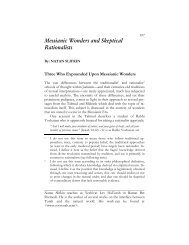Is There a Disconnect between Torah Learning and ... - Hakirah.org
Is There a Disconnect between Torah Learning and ... - Hakirah.org
Is There a Disconnect between Torah Learning and ... - Hakirah.org
Create successful ePaper yourself
Turn your PDF publications into a flip-book with our unique Google optimized e-Paper software.
52 : Hạkirah, the Flatbush Journal of Jewish Law <strong>and</strong> Thought<br />
much stronger chance that later in real life when the boy finds<br />
himself in the status of a ,שואל he will make the connection. Without<br />
that connection, it is likely that the different spheres of knowledge in<br />
his mind will remain neatly <strong>and</strong> safely compartmentalized without<br />
touching each other. Thus in one memory network of his mind he<br />
will have a set of interconnected propositions about the various<br />
<strong>and</strong> their obligations. And in a totally separate memory שומרים<br />
network in his mind he will have a set of interconnected ideas about<br />
how he borrowed something from a friend, how it broke by accident,<br />
<strong>and</strong> perhaps, how when he was a little boy <strong>and</strong> broke something by<br />
accident his mother said it was ok. If we want to make <strong>Torah</strong> learning<br />
have an impact on life, we must make the connections for our<br />
talmidim at the time of learning, as we teach.<br />
Making Specific Connections:<br />
<strong>There</strong> is much evidence from research studies that shows that people<br />
seek consistency <strong>between</strong> their attitudes <strong>and</strong> their actions. They<br />
would like to behave in ways that are consistent with their beliefs.<br />
<strong>There</strong> is however, just as much evidence showing, that quite often,<br />
people simply do not behave in accordance with their clearly stated<br />
<strong>and</strong> even deeply held attitudes <strong>and</strong> beliefs. Amongst the reasons cited<br />
for this failing are situational factors like social pressure <strong>and</strong> selfinterest<br />
that pressure a person to act in ways that contradict his<br />
beliefs. Another factor is the level of specificity in the attitude <strong>and</strong> the<br />
behavior in question. 57 Thus, for example, if I believe that I should<br />
not steal, I am unlikely to place my h<strong>and</strong> in somebody’s pocket <strong>and</strong><br />
take some of his money. However, I might not hesitate to lie <strong>and</strong> tell<br />
a storekeeper that I could get the item for less, elsewhere. My belief<br />
about stealing may not have reached this level of specificity, <strong>and</strong> I<br />
may not see the connection, or even ask a shaila. It’s the old, “I love<br />
humanity, it is people that I can’t st<strong>and</strong>” phenomenon. If my belief<br />
did not reach this level it is because I did not learn to think about it at<br />
this level.<br />
57 Ajzen, I & Fishbein M, Attitude-Behavior relations: A theoretical<br />
analysis <strong>and</strong> review of empirical research, Psychological Bulletin, 1977,<br />
84, 888–918.
















